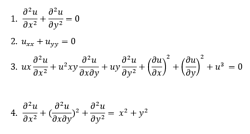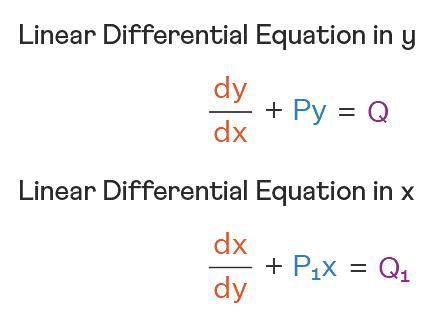The solution of ey-x dy/dx = y(sinx + cosx)/(1 + ylogy)
Approach Solution - 1
Approach Solution -2
Solution to the Differential Equation
Given the differential equation:
ey-x dy/dx = y(sinx + cosx)/(1 + ylogy)
Rearrange to separate variables:
e^(y-x) dy/dx = y(sinx + cosx)/(1 + ylogy)
Simplify and integrate both sides:
∫ (1 + logy) e^y dy = ∫ (sinx + cosx) e^x dx
Using integration by parts, the solution is:
logy * e^y - ∫ e^y / y dy = e^x (sinx - cosx) + C
Where C is the constant of integration.
Top Questions on Differential equations
- Let f(x) be a continuously differentiable function on the interval (0, ∞) such that f(1) = 2 and
\(\lim\limits_{t→x}\frac{t^{10}f(x)-x^{10}f(t)}{t^9-x^9}=1\)
for each x > 0. Then, for all x > 0, f(x) is equal to- JEE Advanced - 2024
- Mathematics
- Differential equations
- If \((t+1)dx=(2x+(t+1)^3)dt\) and \(x(0)=2\), then \(x(1) \)is equal to:
- JEE Main - 2024
- Mathematics
- Differential equations
- If \(\frac {dy}{dx} - \frac {(sin2x)}{(1+cos^2x)}y = \frac {sinx}{1+cos^2x }\)and \(y(0) =0\) then \(y(\frac \pi2)\) is ………..
- JEE Main - 2024
- Mathematics
- Differential equations
- If \(\frac{dy}{dx}\)= \(\frac{(x+y-2)}{(x-y)}\), and y(0) = 2, find y(2)
- JEE Main - 2024
- Mathematics
- Differential equations
- The solution of differential equation \(y\frac {dx}{dy}=x(log_e x-log_e y+1),\ x>0, y>0\) and passing through \((e,1)\) is
- JEE Main - 2024
- Mathematics
- Differential equations
Questions Asked in MHT CET exam
- Two monkeys off mass 10 kg and 8 kg are moving along a vertical light rope the former climbing up with an acceleration of 2 m/second square while the latter coming down with a uniform velocity of 2 m/sec square find the tension in the rope at the fixed support
- MHT CET - 2024
- tension
- Total genetic content of an organism is called
- MHT CET - 2024
- Non-Mendelian Genetics
- How many ATP molecules are needed as an initial investment in the glycolytic cycle (normal glycolysis)?
- MHT CET - 2024
- Glycolysis
- Which disease is primarily spread by female Anopheles mosquitoes?
- MHT CET - 2024
- HIV and AIDS
- Find k if \(\int_{0}^{\frac{1}{2}}[\frac{x^2dx}{(1-x^2)^{\frac{3}{2}}}]=\frac{k}{6}\).
- MHT CET - 2023
- Definite Integral
MHT CET Notification
 MHT CET 2024 CAP Round 2 Seat Allotment Out, Direct Link here.Aug 26, 2024
MHT CET 2024 CAP Round 2 Seat Allotment Out, Direct Link here.Aug 26, 2024Concepts Used:
Types of Differential Equations
There are various types of Differential Equation, such as:
Ordinary Differential Equations:
Ordinary Differential Equations is an equation that indicates the relation of having one independent variable x, and one dependent variable y, along with some of its other derivatives.
\(F(\frac{dy}{dt},y,t) = 0\)
Partial Differential Equations:
A partial differential equation is a type, in which the equation carries many unknown variables with their partial derivatives.

Linear Differential Equations:
It is the linear polynomial equation in which derivatives of different variables exist. Linear Partial Differential Equation derivatives are partial and function is dependent on the variable.

Homogeneous Differential Equations:
When the degree of f(x,y) and g(x,y) is the same, it is known to be a homogeneous differential equation.
\(\frac{dy}{dx} = \frac{a_1x + b_1y + c_1}{a_2x + b_2y + c_2}\)
Read More: Differential Equations



